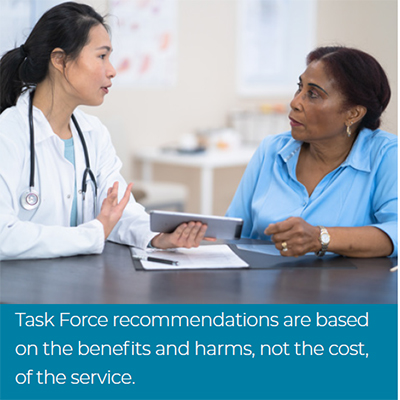The U.S. Preventive Services Task Force (USPSTF or Task Force) is a scientifically independent group of national experts in prevention and evidence-based medicine that makes recommendations to primary care clinicians about preventive services.
The USPSTF works to improve the health of all people nationwide by making evidence-based recommendations about a wide variety of clinical preventive services such as screenings, counseling services, and preventive medications. Recommendations address only services offered in the primary care setting or services referred by a primary care clinician.
Cost Not a Factor in Determining Recommendation Grades
The Task Force does not consider the costs of a preventive service when determining a recommendation grade (A, B, C, D, or I). While the Task Force has congressional authority to review evidence related to cost-effectiveness, it excludes costs from its determination of the benefits and harms of a clinical preventive service. This deliberate decision was made to maintain a clear focus on the science of clinical effectiveness (i.e., "what works"), and not consider cost, in part to avoid any misperception that the Task Force's purpose is to limit health care based on cost.
The Task Force's mission is to assess the available evidence on a particular clinical preventive service, assessing both the potential benefits and harms to patients. It is also to provide primary care clinicians with the appropriate evidence on the effectiveness of clinical preventive services. Considering the potential costs of implementing Task Force recommendations in clinical practice goes beyond this mission and the scope of the Task Force.
Benefits and Harms Assessment in Determining Recommendation Grades
Recommendation grades are based on the quality and strength of the available evidence about the potential benefits and harms of the preventive service, as well as the size of the potential benefits and harms. The Task Force recognizes that clinical decisions involve more considerations than clinical effectiveness alone. In addition to effectiveness, the Task Force also encourages clinicians to discuss values and preferences with patients when determining whether or not to provide a service.
The Task Force recognizes that cost is a consideration for insurers, health systems, purchasers, and consumers. The USPSTF maintains that regardless of how health care is financed, it is essential to understand what the science says about which preventive services work.
Current as of: April 2021

